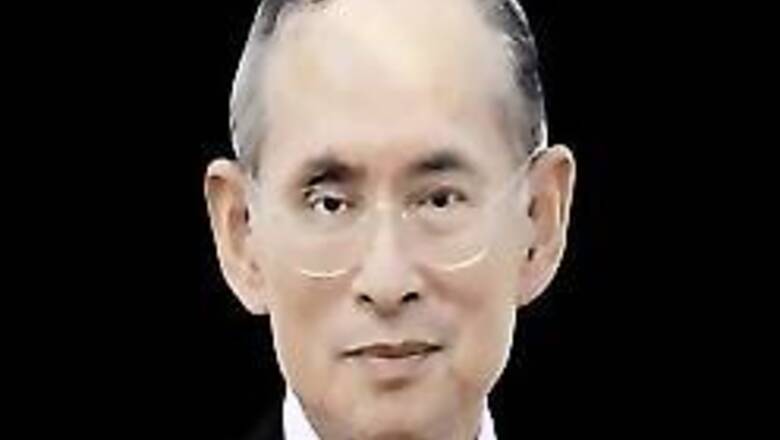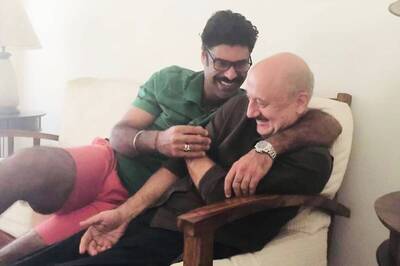
views
Bangkok: Thailand's long-reigning King endorsed the bloodless military coup that ousted the country's Prime Minister, according to a televised statement, and the general who seized power promised to restore civilian rule within a year.
The statement from King Bhumibol Adulyadej came after he met Thai Army Chief General Sonthi Boonyaratglin, who has declared himself the country's interim leader.
Sonthi ousted embattled Prime Minister Thaksin Shinawatra while Thaksin was in New York to attend the UN General Assembly.
In a nationally televised address on Wednesday, he declared the coup d'etat complete and promised power would be returned to the people as soon as possible.
Sonthi met throughout the day with Government officials, Members of Parliament and leaders of other institutions, such as universities, seeking their endorsements.
He said his new ruling council "has so far received cooperation from all sectors of Thai society without any resistance."
Thaksin delivered a nationwide address to the Thai people, as the coup was under way late on Tuesday, saying his Government remained in control.
He canceled his scheduled address to the UN General Assembly and headed for London, where he arrived on Wednesday on what Britain's Foreign Office said was a private visit.
Sonthi called Thaksin "a fellow countryman," and said he had no problem with his return to Thailand. But he insisted that Thaksin would not return as Prime Minister.
The United States, a longtime ally, declared itself "disappointed" in the coup and urged the restoration of civilian rule as soon as possible.
White House spokesman Tony Snow told reporters that a free-trade agreement with Thailand would be held up until the military yielded power.
"We hope those who mounted it will make good, and make good swiftly, on their promises to restore democracy," Snow said.
US State Department spokesman Tom Casey would not say whether the United States wanted Thaksin returned to power, telling reporters, "These are issues for the Thai people to determine."
Thailand now has had 18 coups since World War II. Rumors of the latest had been swirling around Bangkok in recent weeks as Thaksin battled considerable pressure to step down.
The telecommunications billionaire has been accused of abusing the country's system of checks and balances and bending government policy to benefit his family's business.
He had called elections in April, three years early. But the country's constitutional court ruled that vote was unconstitutional, and a new round of balloting had been scheduled for November.
PAGE_BREAK
International reaction to the coup was muted largely on Tuesday because details of the situation were scarce at first.
But on Wednesday, a spokesman for UN Secretary-General Kofi Annan said Annan wanted civilian rule and new elections "as quickly as possible."
Most residents and tourists in Bangkok, a city of more than 10 million, were calm and unfazed on Wednesday.
About 500 people gathered outside Army headquarters on Wednesday afternoon lending moral support to the military and chanting "Thaksin Get Out!"
But in the first sign of anti-coup sentiment, Thaksin supporters faced off with rival groups celebrating the coup at two separate gatherings in Bangkok. Soldiers intervened, narrowly averting clashes.
The newly created Council of Administrative Reform put Thailand under martial law and declared a provisional authority loyal to the king, seizing television and radio stations and ordering government offices, banks, schools and the stock market to close for the day.
Nearly 20 tanks - their gun barrels festooned with ribbons in the monarch's color, yellow - had blocked off the Royal Palace, Royal Plaza, Army headquarters and Thaksin's office at Government House.
A statement from coup leaders urged workers and farmers - Thaksin's key constituents - to remain calm, and said unauthorized gatherings of more than five people were punishable by six months in prison under martial law.
The Nation newspaper in Bangkok said several senior Government officials and others close to Thaksin had been arrested, their fates unknown.
It said they included Deputy Prime Minister Chitchai Wannasathit and Supreme Military Commander General Ruengroj Maharsaranond.
Agriculture Minister Sudarat Keyuraphan, one of Thaksin's closest political associates, fled to Paris with her family, it said.
Reacting to rumors that he would be appointed interim Prime Minister, Central Bank head Pridiyathorn Devakula said, "I haven't been approached, and I don't know whether I am a candidate."
He said that the public has accepted the coup, so it was unlikely to have much impact on foreign confidence in the country, and that the Thai baht currency had recovered from its overnight low with no intervention.
In New York, a Thai business executive who said he was speaking on behalf of Thaksin said the toppled leader was not resigned to his fate.
PAGE_BREAK
"The Prime Minister has not given up his power," said Tom Kruesopon, Chief Executive Officer of Boon Rawd Trading International Co, who said he was traveling with Thaksin.
But Thaksin's official government spokesman, Surapong Suebwonglee, also traveling with him, was gloomier. "We have to accept what happened," he said. "We are not coming back soon."
Some Thais welcomed the coup as a necessary climax to months of demands for Thaksin's resignation amid allegations of corruption and electoral skullduggery, and a worsening Muslim insurgency in south Thailand.
Sonthi, 59, known to be close to Thailand's constitutional monarch, is a Muslim in a Buddhist-dominated nation.
He was selected last year to head the Army, partly because it was felt he could better deal with the Muslim insurgency in the south, where 1,700 people have been killed since 2004. He has urged negotiations with the separatists, in contrast to Thaksin's hard-line approach.
Thaksin, a telecommunications tycoon before entering politics, handily won three general elections after coming to power in 2001 and garnered great support among the rural poor for his populist policies.
But he alienated the urban middle class, intellectuals and pro-democracy activists. They began mass street demonstrations late last year, charging him with abuse of power, corruption and emasculation of the country's democratic institutions, including media that were once among Asia's freest.



















Comments
0 comment